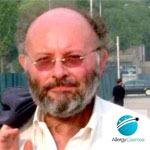Today we spoke with Professor Chris Corrigan at King's College London School of Medicine, as part of our series of interviews with allergy and asthma specialists across the UK. It is our hope that reading about different physicians, researchers and allergy charities will provide you with valuable insight into your life with allergy and asthma in the UK.
Susan: "Professor Corrigan, what is it like to work as an allergist in the UK?"
Prof. Chris Corrigan: "I am delighted to be an allergist. Allergists in the UK are quite a rare breed. They have not flourished as they have in just about every other country, with the result that main parts of the UK are bereft of allergy specialists."
Susan: "Why is that?"
Prof. Chris Corrigan: "Many doctors are frightened of allergic conditions because they do not understand them fully. This is not their fault: as I said, allergists in the UK are few and far between and allergy is not taught very well in UK medical schools. Like every other problem, however, it is not difficult to handle when you know how."
Susan: "So why did you decide to work with allergy and asthma?"
Prof. Chris Corrigan: "I did not set out to be an allergist. I had trained initially at Oxford University and later at King's College Hospital in London. During my early training as a doctor, I realised that I wanted to be a researcher and discover new things about diseases. The first research post as I came across offering this opportunity was in Allergy and Asthma at the Brompton Hospital, where I worked with my then supervisor and now dear friend Professor Barry Kay. More recently I have continued this work at Guy's Hospital with my colleagues, particularly my close friend and colleague Professor Tak Lee."
Susan: "What do you like best about your work?"
Prof. Chris Corrigan: "What I like best about allergy is that it is almost always possible to help people in a very practical way. This may be through helping them to identify allergies and how to avoid exposure to the allergen, very simple advice as to how to take hay fever treatments properly, explaining to them how to manage their asthma better and identify allergic triggers and teaching them how to deal with more serious allergic reactions such as to peanuts. One particularly rewarding ward of treatment is allergy desensitisation injections (immunotherapy) for very severe hay fever. Patients are eternally grateful to have their symptoms greatly reduced after years of suffering every summer. Most of allergy management is just simple, practical advice but almost every patient benefits."
Susan: "Where do you see allergy treatment going in the future?"
Prof. Chris Corrigan: "In the future, I think we will see major advances in allergy treatments. Several of my colleagues are working on a medication to get rid of allergy which will stop allergic antibodies binding to body cells and causing reactions. This is a big task, but they may succeed in my lifetime. I think we will also see a lot more understanding of how to prevent allergy."
Susan: "If you could suggest one thing for your patients what would it be?"
Prof. Chris Corrigan: "If I could suggest one thing for the thousands of allergy sufferers out there, it would be to ask advice about their disease from an expert. Even diseases that you think would be simple to manage can be greatly improved if you know what you are doing. This is what I love about my job: simple, practical help for everyone."
Susan: "Is there anything else you'd like to add?"
Prof. Chris Corrigan: "Allergy is also a very academic subject and has more than repaid my wishes to undertake new research and discover new disease mechanisms. I have also had the chance to build up one of the largest allergy centres in the UK down at Guy's Hospital in London Bridge. We investigate drug and food allergy and make hundreds of hay fever sufferers better every year. Although I treat adults, my colleagues provide an equally extensive and prestigious service for children. Drop-in and see us some time!"
Susan: "Great. Thank you, Professor Corrigan, for your time."




